Key takeaways:
- Game design balances challenge and skill; adjusting game difficulty enhances player enjoyment.
- Effective communication, version control, and code reviews are essential for successful collaborative programming.
- Diverse skill sets and patience during the creative process lead to more robust game development outcomes.
- Vulnerability in teamwork fosters support and opens doors for shared expertise among team members.
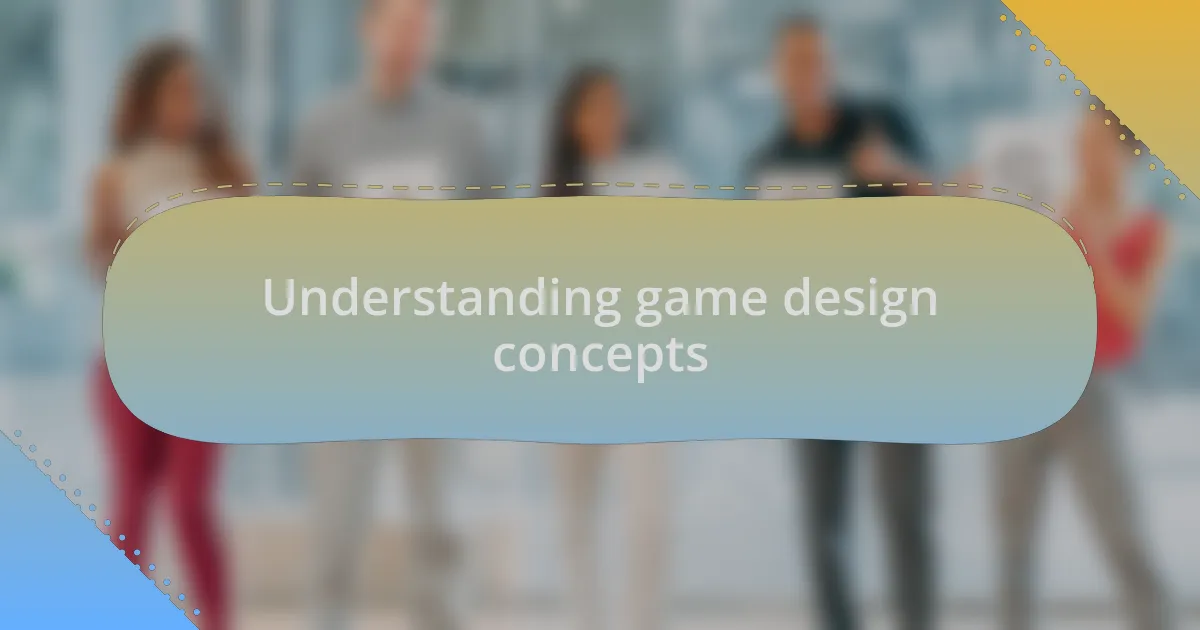
Understanding game design concepts
Game design is more than just visuals; it’s about crafting a meaningful experience. I still remember the first time I played a game that truly resonated with me. It wasn’t just the mechanics that captivated me; it was the story, the characters, and how they made me feel. Have you ever been emotionally invested in a game? That connection is what makes game design a complex yet rewarding endeavor.
One fundamental concept I’ve encountered is the balance between challenge and skill. Too often, games can feel frustrating if they’re too difficult or boring if they’re too easy. I once worked on a project where we implemented a feedback loop to adjust the difficulty based on player performance. It was enlightening to see how that simple tweak transformed player enjoyment. Isn’t it fascinating how adjusting a single element can impact the entire gaming experience?
Moreover, understanding your audience is crucial. In my experience, knowing who you’re designing for helps dictate everything from mechanics to aesthetics. When I designed a casual puzzle game aimed at a younger audience, I realized the importance of intuitive controls and engaging visuals. It made me consider, how can your design choices reflect the desires and needs of the players? This engagement with your audience fosters a deeper connection and often leads to more successful projects.
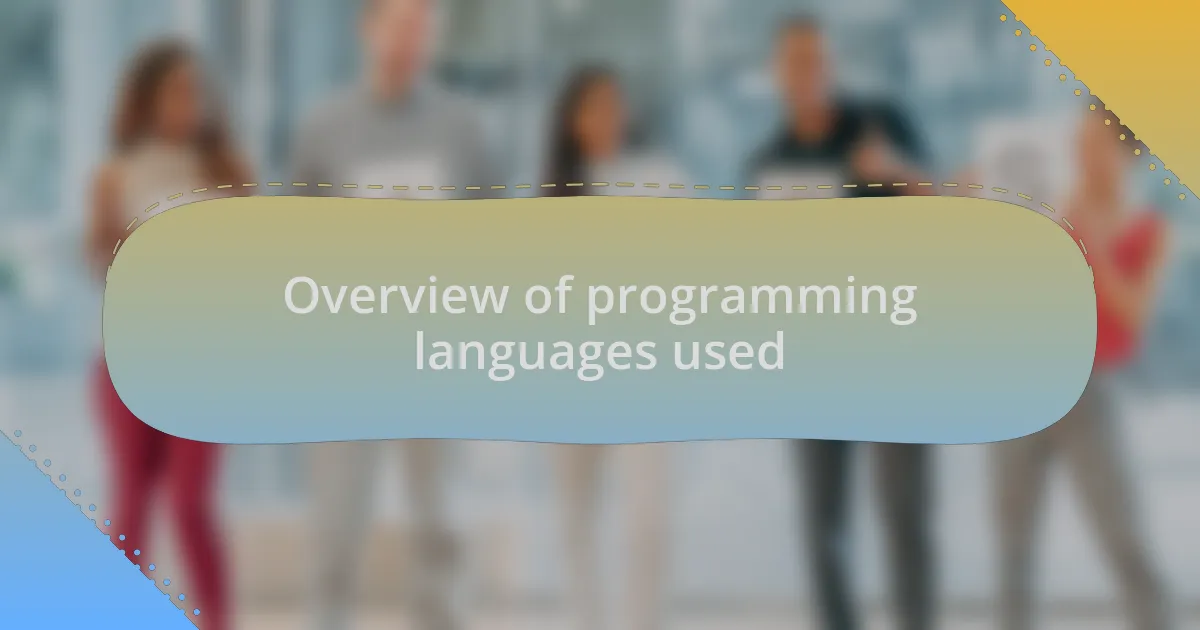
Overview of programming languages used
When it comes to game design, the choice of programming languages is pivotal. In my journey, I’ve primarily worked with C# and Unity, which have become a staple for many indie developers. The ease with which you can prototype and iterate on ideas is something I found invaluable. Have you ever had a thought you needed to bring to life quickly? That’s where these tools shine.
Another language that often comes into play is C++. Although it has a steeper learning curve, its power and performance capabilities can’t be overlooked. I recall a project where we needed to optimize physics calculations for a simulated environment. Switching to C++ for that component increased our frame rates significantly. Isn’t it interesting how sometimes the more challenging options can yield the greatest rewards?
Scripting languages like Python and Lua also play a crucial role, especially for game logic and rapid development. I once integrated Lua for a user-generated content feature, and it was a game-changer for our community engagement. It allowed players to create their content seamlessly, enhancing their investment in the game. What about you? Have you considered how adaptable scripting languages could bring your own game ideas to life?
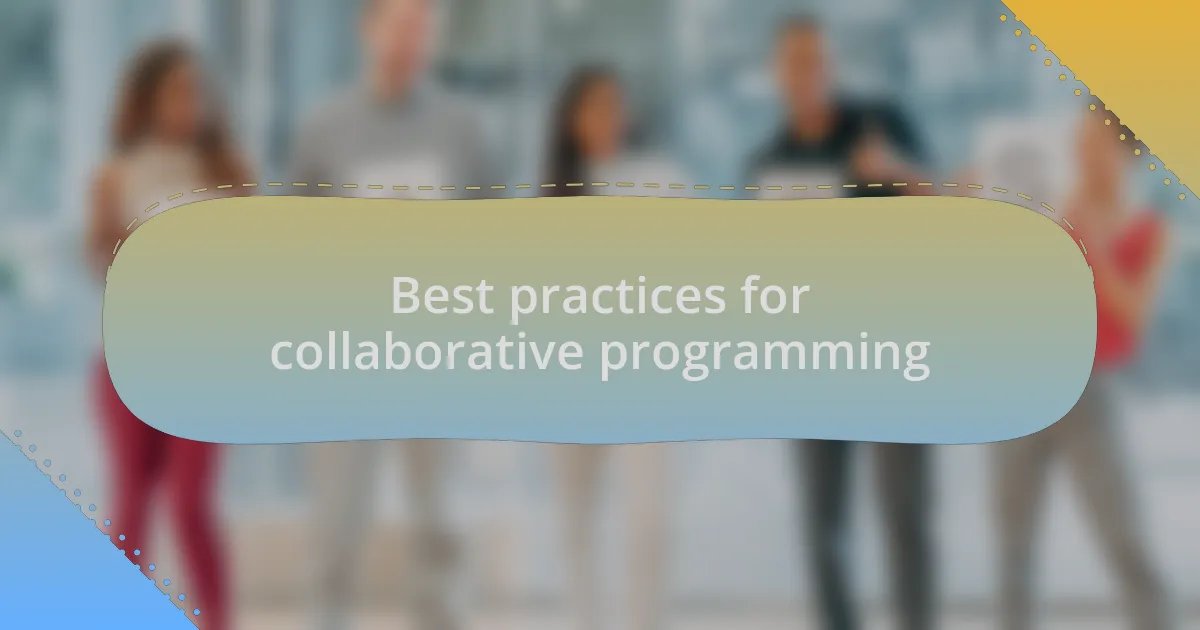
Best practices for collaborative programming
One of the best practices for collaborative programming is establishing clear communication channels among team members. I’ve found that regular check-ins on platforms like Slack or Discord make a world of difference. Have you ever faced bottlenecks because of miscommunication? It’s frustrating, but when everyone is on the same page, we can troubleshoot issues in real time and keep the momentum up.
Version control systems, like Git, are essential in any collaborative project. I still remember the first time I used Git in a group project; it felt like a safety net. Knowing that I could revert changes if something went wrong was a relief. Familiarizing yourself and your team with branching strategies can ensure that everyone collaborates effectively without stepping on each other’s toes.
Lastly, integrating code reviews into your workflow significantly boosts code quality and knowledge sharing. I remember being nervous during my first code review, but the constructive feedback I received improved my skills tremendously. It’s not just about pointing out mistakes; it’s about learning collectively, which can create a profound sense of camaraderie in your team. How often do you prioritize feedback in your own projects?
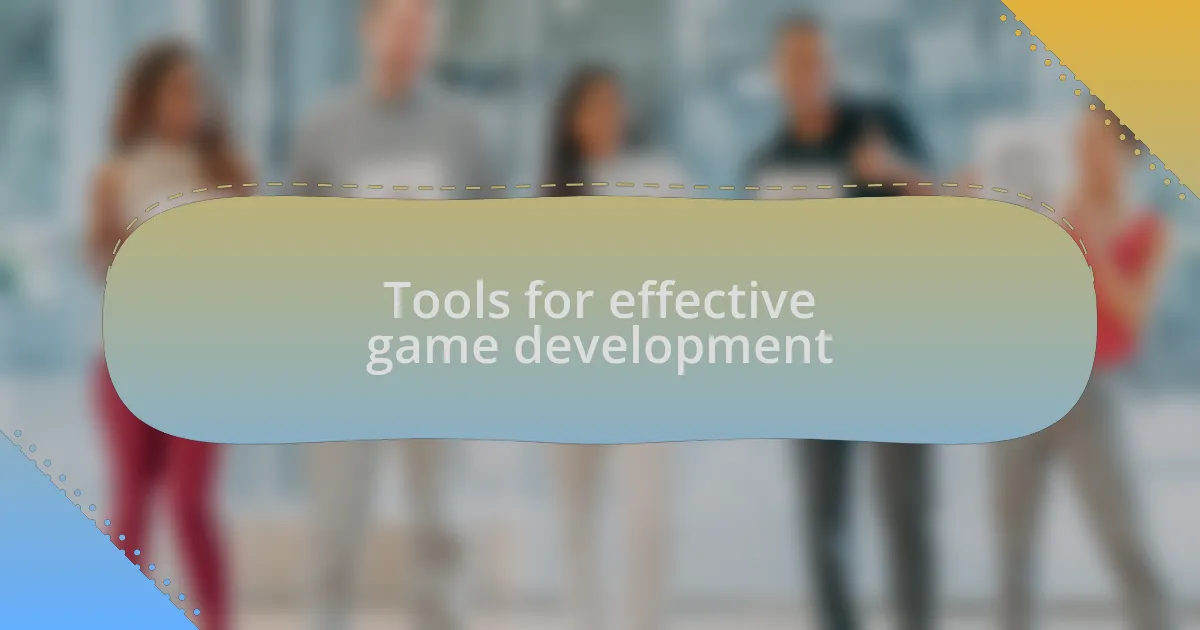
Tools for effective game development
When it comes to game development, the right tools can make all the difference. I recall the first time I experimented with Unity. The intuitive interface surprised me; it felt like I was unlocking a treasure chest of possibilities. Have you ever had that excitement when dragging and dropping assets, watching them come to life in real-time? It’s a feeling that keeps you hooked.
Another essential tool in my toolkit is Blender, especially for creating 3D models. I vividly remember spending hours learning how to sculpt my first character. What amazed me was how accessible it was, despite its robust capabilities. How many projects have stalled because of the complexity of 3D modeling? With tools like Blender, I found it pushes creative boundaries rather than creating barriers.
Lastly, I can’t stress enough the importance of project management software like Trello or Asana in keeping teams organized. I’ve been part of teams where we relied solely on spreadsheets, and let me tell you, it was a chaotic experience. Seeing tasks laid out visually allowed my team to grasp priorities at a glance, fostering not just productivity, but a sense of shared purpose. How much smoother could your projects run with a little more organization?
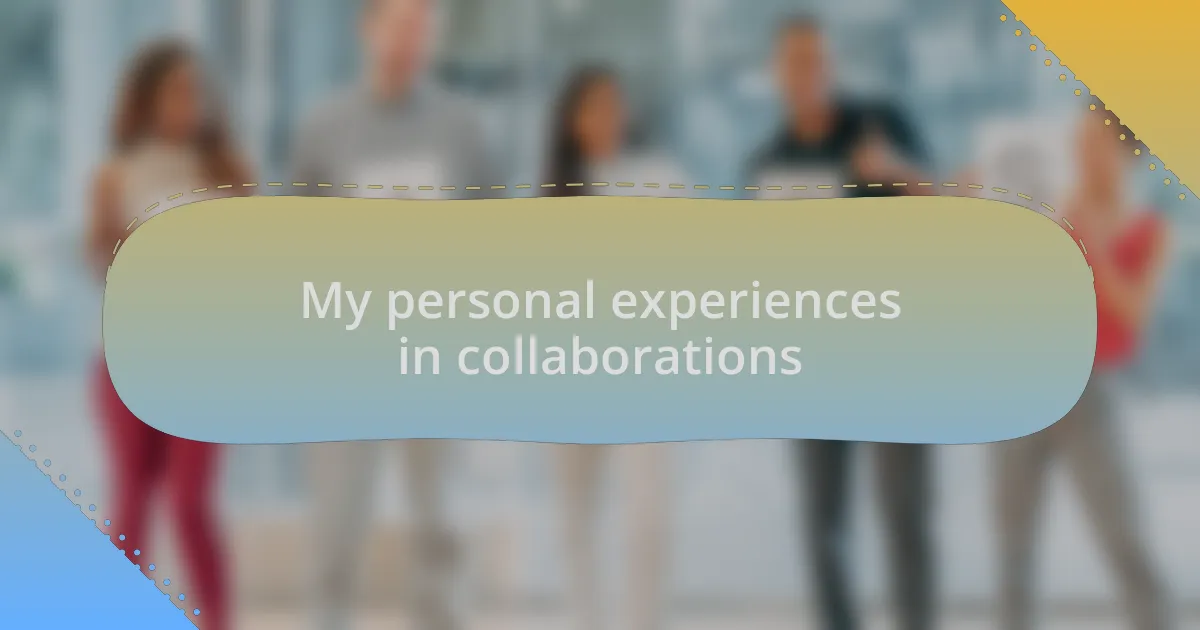
My personal experiences in collaborations
Collaborating with others in game design has profoundly shaped my experiences. I remember my first major group project, where we struggled with communication. I felt the tension in the air both creatively and emotionally as we navigated conflicting ideas. It was a pivotal moment that taught me the significance of open dialogue. Have you ever felt that shift in teamwork where one conversation transformed everything?
In another project, I teamed up with a programmer who had an exceptionally analytical mindset. While I focused on the creative aspects, he brought structure to our chaos. It was fascinating to watch how his logical approach balanced my wild ideas, resulting in a seamless blend of creativity and functionality. Does your experience reflect how different perspectives can enhance collaboration?
On a more personal note, I vividly recall participating in a community game jam. The excitement of working against the clock with strangers ignited a sense of camaraderie that I hadn’t felt before. It was a whirlwind of brainstorming and late-night coding sessions, where laughter and frustration coexisted. Completing that game, despite the tight deadline, was a rush that still motivates me today. Have you ever experienced that unbeatable adrenaline during a collaborative effort?
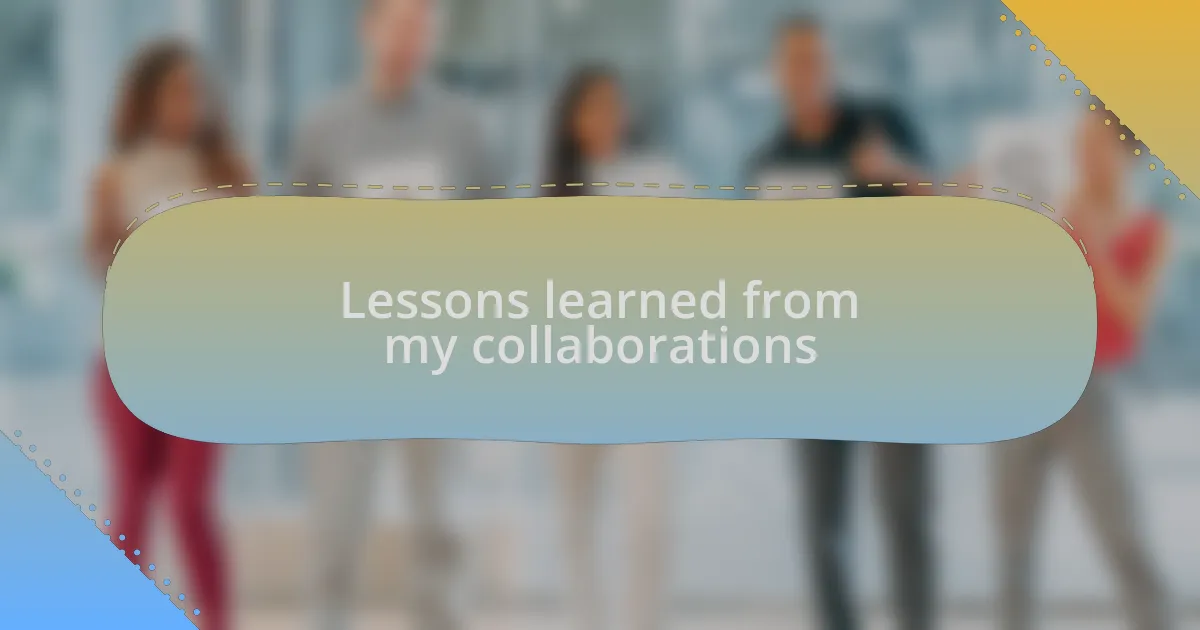
Lessons learned from my collaborations
One crucial lesson I’ve learned from my collaborations is the value of diverse skill sets among team members. I remember working with an artist on a project who had a completely different approach to design than I did. Initially, I was hesitant about integrating his style, but I soon realized how his unique aesthetic choices brought an unexpected depth to the game. Have you ever been surprised at how someone else’s expertise can elevate your own contributions?
Another significant insight was the power of patience during the creative process. I once partnered with a developer who often took longer to understand my concepts. At first, I found myself frustrated and wanting to rush ahead. However, I soon discovered that taking the time to properly communicate our ideas led to more robust solutions. It seemed that those moments of pause actually enriched our final product. What have you found to be the hidden benefits of slowing down in a team setting?
I’ve also learned that vulnerability can enhance collaboration. In one project, I was candid about my lack of experience with a particular game engine. Rather than feeling embarrassed, this admission opened the door for other team members to share their expertise. Surprisingly, what I expected to be a moment of weakness became a foundation for teamwork and mutual support. How has being authentic in your collaborations impacted the group dynamic for you?